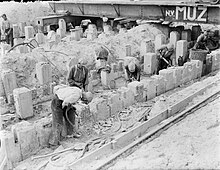| Company type | Naamloze vennootschap |
|---|---|
| Industry | Civil engineering |
| Founded | 1926; 98 years ago (1926) |
| Founder | M.J. van Hattum's Havenwerken Hollandsche Aannemingsmaatschappij A. Bos L. Volker |
| Headquarters | Den Oever, Netherlands |
| Key people | Jean Henri Telders (Chairman), Nicolaas de Ronde Bresser (Secretary), Johannes Aleidis Ringers |
| Products | Dredging, land reclamation |

The Maatschappij tot Uitvoering van Zuiderzeewerken (MUZ) (English: Society for the Execution of the Zuiderzee Works) was a consortium of dredging contractors in the Netherlands, formed in August 1926 for the specific purpose of executing the Zuiderzee Works. The Zuiderzee Works comprised a number of significant hydraulic engineering projects designed to dam the Zuiderzee, a large shallow inlet of the North Sea, to prevent flooding and reclaim land for agricultural and residential use.
The founding companies of the consortium included M.J. van Hattum's Havenwerken from Beverwijk, Hollandsche Aannemingsmaatschappij from The Hague, A. Bos from Dordrecht, and L. Volker.
MUZ was headquartered in Den Oever and was responsible for the construction of several key projects of the Zuiderzee Works, including the Afsluitdijk, a major dam and causeway completed in 1932 that converted the Zuiderzee into the freshwater IJsselmeer. The work carried out by the MUZ consortium significantly influenced water management and contracting practices in the Netherlands, but the lack of competition for major infrastructure projects arising from the creation of such a large entity attracted criticism.
Formation
The consortium was led by J.A. Ringers, an engineer previously employed by Rijkswaterstaat whose hydraulic engineering experience included overseeing the construction of the Noordersluis at IJmuiden. Whilst Ringers' involvement provided significant technical expertise and governmental trust, there remained some concerns that awarding a series of large infrastructure projects to a single joint venture entity created an effective monopoly. These concerns were partially assuaged by the formation of a rival consortium in 1927, known as Maatschappij tot Aanneming van Zuiderzeewerken (MAZ) (English: Society for Contracting Zuiderzee Works).
Projects and developments
The first project undertaken by the MUZ was the construction of the Pilot Polder at Andijk (Dutch: Proefpolder Andijk). On 17 September 1927, a competitor organisation known as the Society for Contracting Zuiderzee Works (Dutch: Maatschappij tot Aanneming van Zuiderzeewerken, MAZ) was founded. The MAZ was established by N.V. Maatschappij tot Aanneming van Werken, owned by A.L.J. (Leendert) Volker of Bussum, and Johannes Kraaijeveld of Sliedrecht, with the company later becoming Boskalis. This consortium was based in Anna Paulowna, with its first project being the construction of a dike around the Boezemmeer south of Wieringen.
Over time, additional contractors joined the MAZ joint venture, including A. Prins and K.L. Kalis. Several companies from outside the two joint venture groups, such as Breejenbout and Zanen Verstoep, participated in the Zuiderzee Works through special arrangements.
During the Great Depression, economic challenges necessitated increased collaboration within the Netherlands dredging industry. This led to the establishment of an association of Dutch dredging contractors known as the Vereniging “centraal baggerbedrijf” which ultimately facilitated the merger of the MUZ and MAZ organisations. Historical records indicate significant cultural differences between these two organisations, with the MUZ often described as more formal. This perception is noted in an appendix to the 2001 reissue of the book Het verjaagde water, which includes a historical account of events undertaken by researchers from Delft University of Technology.
See also
References
- ^ Korteweg, J. (2018). Breaking New Ground: Dutch Dredging Pioneers. Balans. ISBN 978-94-6003-967-6. Retrieved 19 July 2024.
- "N.V. Mij tot Uitvoering van Zuiderzeewerken ( MUZ ) - Owner | Dredging Database". www.dredgepoint.org. Retrieved 19 July 2024.
- ^ Sluyterman, K.; Bouwens, B. (2010). Verdiept Verleden: Een eeuw koninklijke Boskalis Westminster en de Nederlandse Baggerindustrie [Deepened Past: A Century of Royal Boskalis Westminster and the Dutch Dredging Industry] (in Dutch). Amsterdam: Boom. pp. 100–116. ISBN 978-90-8506-949-2.
- van der Ham, W. (2007). Verover mij dat land: Lely & de Zuiderzeewerken [Conquer me that land: Lely and the Zuiderzee Works] (in Dutch). Amsterdam: Boom. ISBN 978-90-8506-437-4.
- "De maatschappij tot uitvoering van Zuiderzeewerken" [The Society for the Execution of Zuiderzee Works]. Nieuwe Rotterdamsche Courant (in Dutch). 18 August 1926. Retrieved 19 July 2024 – via Delpher.
- de Gruyter, C.; Bos Janszoon, W. (1960). Gedenkboek ter gelegenheid van het vijftigjarig bestaan van de N.v. Baggermaatschappij Bos en Kalis gevestigd te Sliedrecht 1910-1960 [Commemorative Book on the Occasion of the Fiftieth Anniversary of the N.v. Dredging Company Bos and Kalis, located in Sliedrecht 1910-1960] (in Dutch). Sliedrecht. pp. 15–16.
{{cite book}}: CS1 maint: location missing publisher (link) - Fototechnische Dienst K.L.M. "Zuiderzeewerken: Dijk om het boezemmeer ten Z. van Wieringen 10 sept. 1928" [Zuiderzee Works: Dike on the boezemmer to the south of Wieringen, 10 September 1928.]. Rijksmuseum (in Dutch). Retrieved 19 July 2024.
- den Doolaard, A. (1954). "Keeping Holland Above Water: The Facts Behind the Epic Struggle". The Atlantic. ISSN 2151-9463. Retrieved 20 July 2024.
- den Doolaard, A.; d' Angremond, K.; Schiereck, G.J (2001). Het verjaagde water [Roll back the sea] (in Dutch). Delft: VSSD/Delft Academic Press. ISBN 9789065624116. Retrieved 19 July 2024.
- Olink, H. (2012). Dronken van het leven. A. den Doolaard: biografie van de zwerver, schrijver en journalist [Drunk on Life. A. den Doolaard: Biography of the Wanderer, Writer, and Journalist] (in Dutch). Amsterdam: Atlas. ISBN 9789045017938.
- Bleyi, R.H.J. (1998). Het verjaagde water, de getijbeweging op Walcheren en de caissonsluitingen in 1945/1946 (Het verjaagde water, the tidal movement on Walcheren and the caisson closures in 1945/1946) (Masters Thesis). Delft University of Technology.